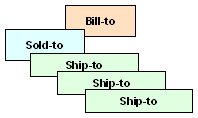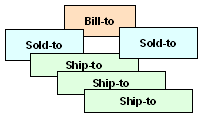Purpose: Use the Customer Maintenance programs to maintain existing customer information and create new customer records without creating orders. You use the Customer Maintenance programs when you need to:
• Enter customer address changes
• Construct a demographics profile
• Create a contract price for a short-term sale
• Change a customer's tax status, payment type, etc.
• Add a customer service action note
• Review a customer's ordering history
• Update information on an individual who places orders
In this topic:
Purpose: There are four customer types:
• Sold-to
• Ship-to
• Bill-to
• Individual
You need to understand the customer types in order to work with Customer table maintenance.
Sold-to customers: A sold-to customer is a person who places an order. Name, address, and mailing information for sold-to customers is in the Customer Sold-to table only.
Note: The Relate Customer Integration includes only sold-to customers.
Ship-to customers: A ship-to customer is a person who receives an order. The system generates a temporary ship-to record for every sold-to customer when you enter an order. You can create permanent ship-to customers through Customer Ship-to when you enter an order.
• Permanent ship-to customers are customers who request a ship-to address different from their sold-to address. The Customer Ship-to table stores permanent ship-to customer information.
• Temporary ship-to customers are customers who receive the shipped order but do not place the order or pay for the order (for example, gift recipients). The Order Ship-to Address table stores temporary ship-to customer information.
Bill-to customers: A bill-to customer is a person who pays for an order. A bill-to customer record is required when:
• The order is paid through accounts receivable (A/R) or C.O.D. In this case, the bill-to and sold-to may be the same or may be different; or
• The person who pays for the order is different than the sold-to customer.
You can assign bill-to customer addresses through Order Entry if the system control value Create/Assign Bill To Customers in Order Entry (A76) is selected.
The system generates bill-to records for business-to-business customers. Business-to-business customers are customers who ship to a consistent address, have a permanent account (A/R), and are commercial in nature.
You can define a business-to-business customer by selecting the Commercial flag for a customer. Once you have established a bill-to customer account, the account remains permanently in the Bill-to customer table.
Individual customers: An individual customer is a person within an organization who places or approves an order. In this case, the organization is the sold-to customer, and it can have any number of individual customers in various departments.
The individual customer record differs from the permanent ship-to customer record in that it is designed to accommodate organizational information, such as department, position, mail stop, and e-mail address.
In general, if the Individuals Required in Order Entry (E01) system control value is selected, the system will require you specify an order placer and, optionally, an order originator before you enter each order. If this system control value is unselected, individual selection may not be required; however, you always have the option of specifying an individual placer or originator through the Work with Order Ship to Properties Screen in Order Entry.
The figure below illustrates the relationships between the customer types.

|
(Sold-to) customer places, receives, and pays for order. Payment methods: Cash, Check, Coupon, Credit Card |
|
(Sold-to) customer places and receives order, but someone else receives the bill. The Sold-to may also receive the bill if the payment method is A/R, requiring a separate bill-to record that includes the Sold-to name and address. Payment methods: A/R, COD, Credit Card |
|
(Sold-to) customer places and pays for order, but directs shipment to another (Temporary Ship-to) person. Payment methods: Cash, Check, Coupon, Credit Card |
|
(Sold-to) customer orders for one or more (Permanent Ship-to) locations, and directs bill to a separate (Bill-to) accounting function. Payment methods: A/R, Credit Card |
|
One or more (Sold-to) customer orders for one or more (Permanent Ship-to) receiving locations, but each Sold-to directs their bills to a single (Bill-to) accounting function. Payment methods: A/R, Credit Card |
|
One or more individuals places or approves orders for a single Sold-To customer. Payment methods: any. |
Rules to remember: The following is a list of guidelines to keep in mind when working with the different customer types.
• Every order has at least a sold-to customer
• The system automatically creates a bill-to customer record if the method of payment is accounts receivable (A/R) or C.O.D; this bill-to record can have the same address as the sold-to, or can have a separate billing address
• The system creates a bill-to record for payment methods other than accounts receivable if the person paying for the order is different from the person placing the order
• More than one permanent ship-to record can exist under a single sold-to, if the sold-to regularly places orders to be shipped to different locations
For more information: See Creating and Updating Customers for options related to creating and working with each customer type.
| Creating and Updating Customers | Contents | SCVs | Search | Glossary | Reports | Solutions | XML | Index | Selecting Customers |

CS03_01 OROMS 5.0 2018 OTN




